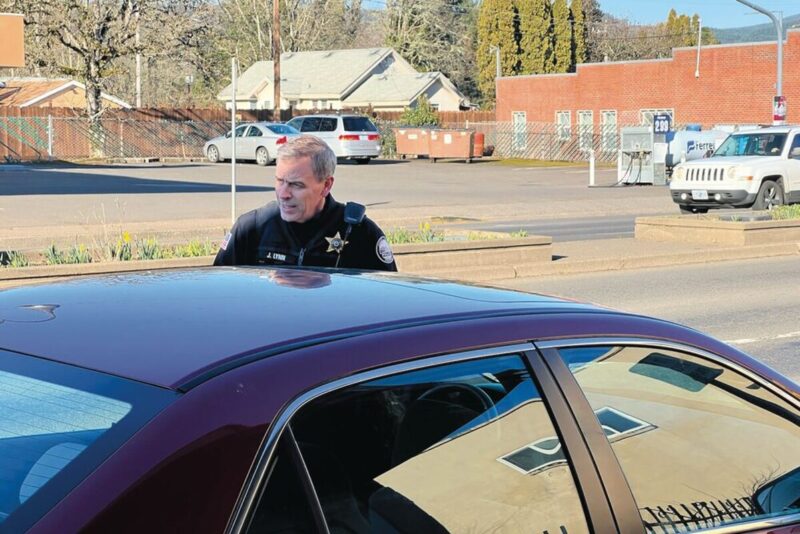Benny Westcott
Staff shortages affect many organizations these days. The Sweet Home Police Department is no exception.
At the beginning of 2021, it had 15 officers taking calls, down from 16 at the beginning of the previous year. Now that number’s dropped to seven, including Police Chief Jeff Lynn and Captain Jason Ogden, who have both been on patrol, responding to calls and performing other tasks normally reserved for regular officers.
What happened?
Four officers left law enforcement last year to work in the private sector. A fifth departed during field training. Two transferred to other police departments, one in Albany and the other in North Bend. On top of that, Sergeant Jason Van Eck retired after 28 years. (Former officer Dave Hickcox was promoted to that position.)
According to Ogden, the department normally has one detective, sometimes two. But currently, Sweet Home has no one to handle major crimes.
“The last year, it’s been pretty tough,” he said. “Officers are having to do follow-up that is time-consuming, which would normally be picked up by a detective.”
What accounts for this shortage?
“It’s more difficult to attract qualified applicants because a lot of people who are qualified are not getting into law enforcement,” Ogden said. “They are doing other things and going into careers where they can probably make more money, have a better schedule and not have to work weekends and holidays. Being in the public sector, we are competing with the private sector.”
Sweet Home’s staffing struggles are consistent with those faced by other mid-valley departments. According to a recent Mid-Valley Media article, Lebanon was short four officers as of mid-February. Earlier that month, the Linn County Sheriff’s Office sought to hire seven patrol deputies, four corrections officers, four dispatchers, a custodian and an animal control officer. Corvallis and the Benton County Sheriff’s Office each had five patrol openings by the month’s second week.
Sweet Home has currently made four of eight hires. Two are currently enrolled in the 16-week Department of Public Safety Standards and Training (DPSST) program in Salem and are expected to graduate within the next few months. The others have yet to enter training, Ogden said. Four slots remain to bring the department to its preferred capacity.
“We would love to hire people that are local and qualified,” Ogden said. “We would love to see people that are local stick around and want to work here long-term. But we are not just hiring locally.”
He described the qualities necessary in candidates: “You’ve got to have a pretty solid character, integrity and a willingness to serve others. You’re a public servant; you have to be willing to step in there and serve other people and enjoy that kind of work.”
The hiring pool has certainly changed since 1997, when Ogden began his career in Sweet Home. Back then, he said, 75 people applied for two open positions, one of which he ultimately filled. “I don’t have a shot,” he thought to himself. “There’s no way I’ll get hired.” Such turnouts were common at the time, with numbers as high as 100.
In 2022, on the other hand, Ogden said, “We might have 15 to 20 people put in an application, then four or five that actually show up for testing. Out of those, maybe one might go on to the next phase of the process.”
He also cited a shift in cultural attitudes toward law enforcement.
“There has been an increased on a one-sided narrative from the media and cultural influencers that paint law enforcement only in a negative light,” he said. “Have some bad decisions been made by police over the years? Yes. They should be held accountable for those decisions. But there is also a lot of good that never gets reported.”
On the positive side, the department’s currently well-staffed with dispatchers, and the current strategy doesn’t involve cutting positions.
“I don’t want to become a smaller department,” Ogden said.
So, for the time being, much of the Sweet Home Police Department’s focus will be on hiring new officers and retaining the ones it has, working to maintain its level of service.
“We are limping a little bit, but we are keeping up,” Ogden said. “Obviously, we are still handling these calls, but we are not as efficient as we could be. The chief and second-in-command [Lynn and Ogden] are down in the weeds handling calls, when generally we are kind-of focused on the oversight and leadership aspect. We are still doing that, but we are also being pulled in many different directions.
“It’s been busy and challenging, having your own calls for service but then having other responsibilities that come with the position. But we’re doing it.”





